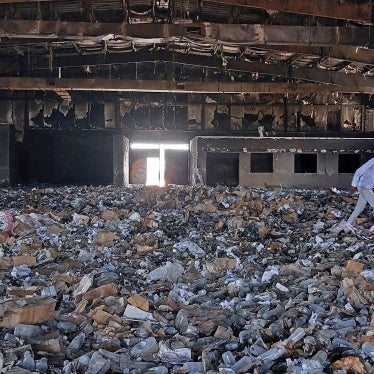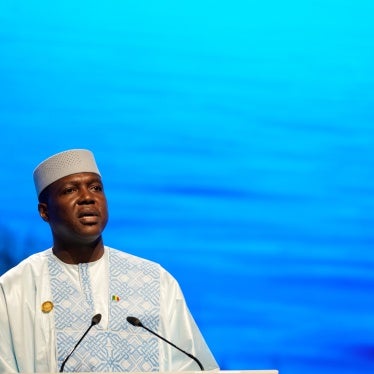Former Sen. Russ Feingold (D-Wis.) is about to step down as U.S. Special Envoy to the Great Lakes Region of Africa. At a time when the Obama administration’s foreign policy appears frustrated in the Middle East and stymied in Eastern Europe, Feingold has played an important role for the U.S. government in addressing one of the world’s worst human rights and humanitarian crises. The Obama administration needs to keep the momentum going.
Feingold’s vocal leadership helped end an abusive rebellion in eastern Democratic Republic of Congo and strengthened the fight against impunity for serious crimes there. His consistent emphasis on freedom of expression and the need for Congo’s leaders to respect the country’s constitution could contribute, down the road, to seeing democracy take hold. Some of this progress, however, could be quickly eroded if the State Department downgrades the position or is slow to appoint a successor.
Despite the grim reality in eastern Congo, for decades the ongoing crisis received limited attention in Washington. That is not for lack of gloomy statistics: Around 2.7 million people remain displaced, over two dozen armed groups control vast swathes of territory, and many civilians live in fear of the next attack. Thousands have been killed in massacres, suffered horrific rape and sexual violence, and watched their children forcibly recruited into armed groups. Congolese army soldiers have also been responsible for serious abuses, preying on the population they are meant to protect.
When Feingold began his job 20 months ago, eastern Congo was witnessing a new wave of violence brought on by the M23 – a Rwandan-backed armed group responsible for widespreadwar crimes. For many years, international actors had allowed Rwanda’s impressive progress in development, the economy, and health care to trump its meddling in eastern Congo and its poor domestic human rights record. This position changed significantly with the rise of the M23. Following high-level pressure from the US and other governments, the Rwandan government pulled the plug on the M23 in November 2013, hastening its defeat and forcing its leaders to flee to neighboring countries.
Feingold played a critical role in supporting a political solution to the end of the M23 and the signing of the so-called “Nairobi Declarations” in December 2013. These declarations stated that those responsible for serious abuses would be arrested and brought to justice, an important shift from past failed peace agreements in which former rebels were integrated en masse into the Congolese army and war criminals rewarded with positions, wealth, and power – often only to defect again and start a new armed group.
But the demise of the M23 was not the end of the story, as a plethora of other violent armed groups have continued to terrorize civilians in eastern Congo. The M23’s leaders remain at large, effectively shielded from justice by the Rwandan and Ugandan governments, despite the fact that many are on US and UN sanctions lists and wanted on Congolese arrest warrants for war crimes and crimes against humanity.
The Congolese government has finalized its plans for a new demobilization program for 12,000 M23 and other combatants, but putting the plan into effect has been tragically slow: over 100 former combatants and family members died last year in a remote demobilization camp as they waited for the government to provide them with adequate food and health care. Helping to ensure that the demobilization program moves forward should be a priority for the next US envoy.
Meanwhile, a political crisis has been simmering in the capital, Kinshasa, forming perhaps the gravest threat to the country’s stability. Under Congo’s constitution, President Joseph Kabila should step down in 2016 after serving two terms, a prospect that he and many around him don’t seem comfortable with. Although the elections are still more than a year away, tensions are rising across the country. Early this year, at least 40 people were killed and several opposition party and civic leaders arrested during demonstrations in Kinshasa and other cities to protest proposed changes to Congo’s electoral law that would have delayed elections and enabled Kabila to prolong his term.
Feingold has played a leading role among foreign diplomats in demanding that Kabila respect the constitution and that Congolese people be allowed to speak freely and demonstrate peacefully. As he said during his final speech as special envoy on February 24: “A peaceful opposition and civil society are key stakeholders in the electoral process, and they must be permitted to express themselves without fear of reprisals. Security force abuses against those who peacefully seek to promote the democratic process earn our condemnation and damage bi-lateral relationships.”
Many Congolese have supported Feingold’s actions, which have echoed positions taken by the Catholic church in Congo and prominent local rights groups. In a recent poll conducted in Kinshasa by a reputable local pollster, 84 percent said they approve of the US-backed peace process, which is pushing for democratic accountability and an end to meddling by Congo’s neighbors.
The coming period will be critical in trying to ensure that these tensions do not spill over and lead to further widespread abuses. Strong international voices will be essential to ensuring that the basic rights of Congolese citizens are protected in the midst of the political turmoil.
To build on progress made during Feingold’s tenure as Great Lakes Envoy, and ensure continued US engagement, the US should appoint a strong successor as soon as possible. The new envoy should also play a more prominent role in relation to Congo’s neighbors, Burundi and Rwanda, where elections are also due in 2015 and 2017, respectively. But both countries have imposed restrictions on freedom of speech, cracked down on government opponents and critics, and allowed near-total impunity for security force abuses.
Six years ago, Barack Obama stated on his first trip to Africa: “We must stand up to inhumanity in our midst. It is the death sentence of a society to force children to kill in wars. It is the ultimate mark of criminality and cowardice to condemn women to relentless and systematic rape. We must bear witness to the value of every child in Darfur and the dignity of every woman in the Congo.”
President Obama should live up to that promise by quickly replacing Feingold with an envoy of similar stature and expertise. In doing so he would make clear that the US commitment to the people of Congo is not limited to one individual but is ongoing and a central ingredient of its Africa policy.
Stearns is the director of the Congo Research Group at New York University’s Center on International Cooperation. Sawyer is a senior Africa researcher at Human Rights Watch who has lived in Congo since 2008.








